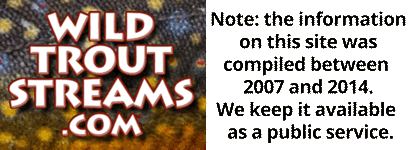
The nature of small streams requires a different interaction between you and other fishermen compared to what might be acceptable on a stocked stream. Most fishermen go to small streams for solitude and quiet. At the heart of good etiquette is doing what’s necessary to respect others’ desires for privacy and a rewarding fishing experience.
Here are some special considerations for fishing small streams…
Give other fishermen plenty of room. One fisherman working a small, headwaters stream can wipe out the fishing for several hours until the fish settle down again. If you find yourself fishing “behind” that person, you’re not going to catch much.
“Giving someone room” will differ on different streams, but on most headwaters streams it means enough space for several hours of fishing… perhaps half a mile or more (NOT the one cast distance you might experience on a crowded, stocked stream). On a more fertile, lowland stream, where there are many fish in each structure, it might just be the next pool (and letting the other guy leapfrog you). If it’s a truly small headwaters stream, and you see another fisherman’s car at an access point, go somewhere else. If it’s a longer stream, seek out the other fisherman, and work out a fair division of the frontage. If you’re the second fisherman on the stream, you should volunteer to do the walking.
Leave behind only your footprints, and clean up other’s trash if you find it. This is especially important on private land. If the landowner finds trash on his property, he may decide to post it, and you’ll be out a fishing stream.
Please practice catch and release. These fish don’t come out of a state hatchery. Please give them a chance to live and reproduce. We share more thoughts here, and provide an excellent guide for download here.
If you decide to kill fish (and obviously do so only within the bounds of the state or tribal fishing regulations), please kill them quickly and humanely. There are few things more upsetting to other fishermen and hikers than finding fish struggling on a stringer. It’s enough to create converts to PETA, and goodness knows we don’t need any more.
Be nice. I guess it should go without saying (and is probably useless advice to those who would violate it). Most of the folks I’ve interacted with on streams have been great. It would be even better if everyone acted that way.
Of course, two things are the same, everywhere:
-
Make sure you have a valid fishing license. The fish and wildlife departments
do a lot of work to protect the water resources we take for granted. The least
we can do is support them by purchasing a license. -
If the water is posted, don’t fish without permission. Someone on a trout
forum I frequent suggested showing up with a garbage bag in hand when asking
for permission, and offering to clean up. That struck me as a good idea.

